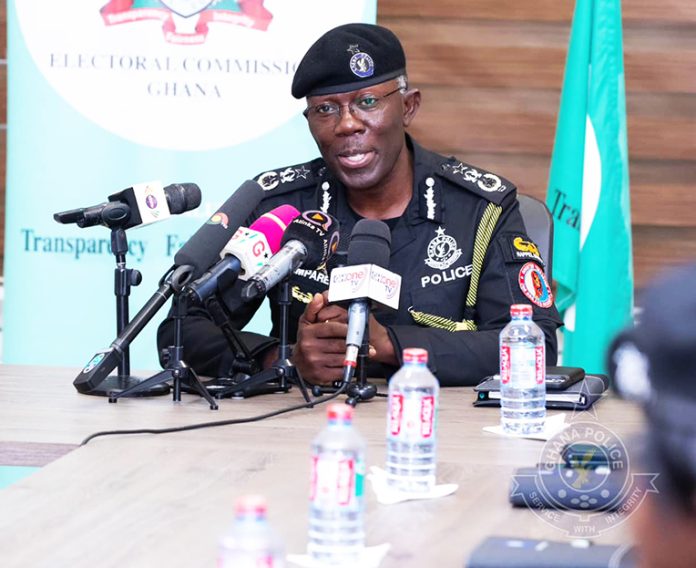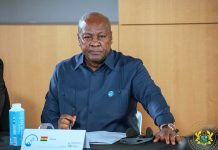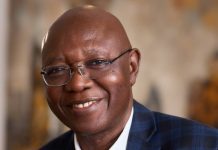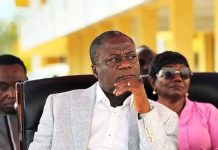The Inspector General of Police (IGP) and Chairman of the National Election Security Task Force (NESTF), Dr. George Akuffo Dampare has cautioned private security operators to refrain from interfering with the work of state security agencies during the upcoming electoral process.
Speaking during an engagement with private security operators on December 1, 2024 Dr. Dampare emphasised that state security agencies, led by the police, hold sole responsibility for maintaining law and order during elections.
“Our discussion is centered on ensuring that our brothers and sisters in the private security sector carry out their activities in a way that complements the security arrangements we have put in place,” Dr. Dampare stated.
He stressed the importance of projecting a unified and professional approach to election security, ensuring that both citizens and international observers have confidence in Ghana’s ability to conduct peaceful elections.
“We do not want any confusion about who is in charge of security,” the IGP added. “We aim to create a secure environment where every voter feels confident to exercise their rights without intimidation or apprehension.”
Dr. Dampare assured political parties, candidates and voters that the state security apparatus is fully prepared to provide a safe electoral environment.
He discouraged political actors from attempting to organize private security for their activities, reiterating that state agencies are wholly responsible for electoral security.
The IGP further urged private security personnel to avoid actions that could confuse or intimidate the public, particularly the sight of unauthorized uniforms that might undermine voter confidence.
“We want voters to walk into polling stations peacefully, with the assurance that no one will intimidate them or disrupt their rights,” he stated.
Dr. Dampare concluded by urging private security operators to align their operations with state protocols, emphasising the need for unity and professionalism to uphold Ghana’s reputation for peaceful elections.
“We stand ready to support all stakeholders as long as their actions contribute to a safe and credible electoral process,” the IGP affirmed.
In response, the President of the Private Security Association of Ghana, Ibrahim Abdul-Rahman Usunaba, assured the public of the association’s commitment to supporting state-led efforts.
“Our mandate is guided by the Police Service Act, and we have been in constant dialogue with the Election Task Force and police administration,” Usunaba said. “We have educated our members to act professionally on election day and avoid actions that could harm the industry or Ghana as a whole.”
He reaffirmed the private security sector’s dedication to adhering to directives from the police and other state agencies to ensure a peaceful and credible election process.
The engagement reflects a broader effort by the National Election Security Task Force to coordinate with all stakeholders and minimize potential disruptions during the elections.
Welcome international observers
Meanwhile, the Ghana Police Service has warmly welcomed international election observers, including a delegation led by former Botswana President, Mokgweetsi Masisi, as the country prepares for its upcoming elections.
At a gathering in Accra yesterday, Inspector General of Police (IGP) and Chairman of the National Election Security Task Force (NESTF), Dr. George Akuffo Dampare, reaffirmed Ghana’s commitment to conducting a peaceful and credible election.
Addressing the observers, Dr. Dampare highlighted Ghana’s pride in its democratic processes, emphasising its history as a beacon of stability on the African continent.
“To those coming from as far as the Caribbean, we say welcome back home,” he said, underscoring Ghana’s Pan-African heritage and global democratic ties.
“We aim to give you a gift of peace to take back to Africa and beyond,” the IGP remarked, reflecting Ghana’s role as a leader in democratic governance.
The former president of Botswana expressed gratitude for the warm reception and noted the critical role of observers in promoting democracy.
“We are here as humble servants of the Commonwealth, to help our fellow member country, Ghana, realize its goals of conducting a credible election process,” President Masisi stated.
The Commonwealth Observer Group, assembled by the Secretary-General of the Commonwealth, has been tasked with monitoring the elections and will present its findings on December 13.
Election Security Measures
The event also provided a platform for the Ghana Police Service to outline its robust security plans.
DCOP Frederick Adjei, Director-General of the Police Intelligence Directorate, presented a detailed security framework designed to ensure peace before, during, and after the elections.
Key measures include:
Election as a Continuous Process: The Police Election Security Secretariat (TESS) oversees election security across all phases, guided by the Pre-election, Election, and Post-election Security Plan (PEP).
Comprehensive Deployment: Over 40,000 polling stations nationwide will be secured, with real-time digital monitoring of personnel assignments.
Emergency Response: Rapid response teams will be on standby to handle incidents that exceed the capacity of polling station officers.
De-escalation First Approach: Officers are trained to prioritize de-escalation to maintain order and avoid violence.
Training and Preparation: Security personnel have undergone specialised training using an election-specific manual to ensure professionalism.
DCOP Adjei assured the public of the task force’s preparedness, stating, “We have identified hotspots among the 4,647 polling stations and are working with the public to address any concerns.”
Observers Raise Key Questions
International observers sought clarification on several issues, including:The monitoring of social media during the elections; Security arrangements for political rallies, particularly for the two leading parties.
Strategies to address potential conflicts during and after the polls
COP Paul Manly Awini, Director-General of Administration, addressed these concerns, emphasising that the police have adopted the United Nations Crime Assessment Prevention Tool to manage risks such as armed conflict and terrorism.
“We have few issues, but we will deal with them professionally. As an institution, we operate with a de-escalation mindset,” he said.
The election observers, representing countries from across the globe, are expected to monitor activities until mid-December, ensuring transparency and accountability.









